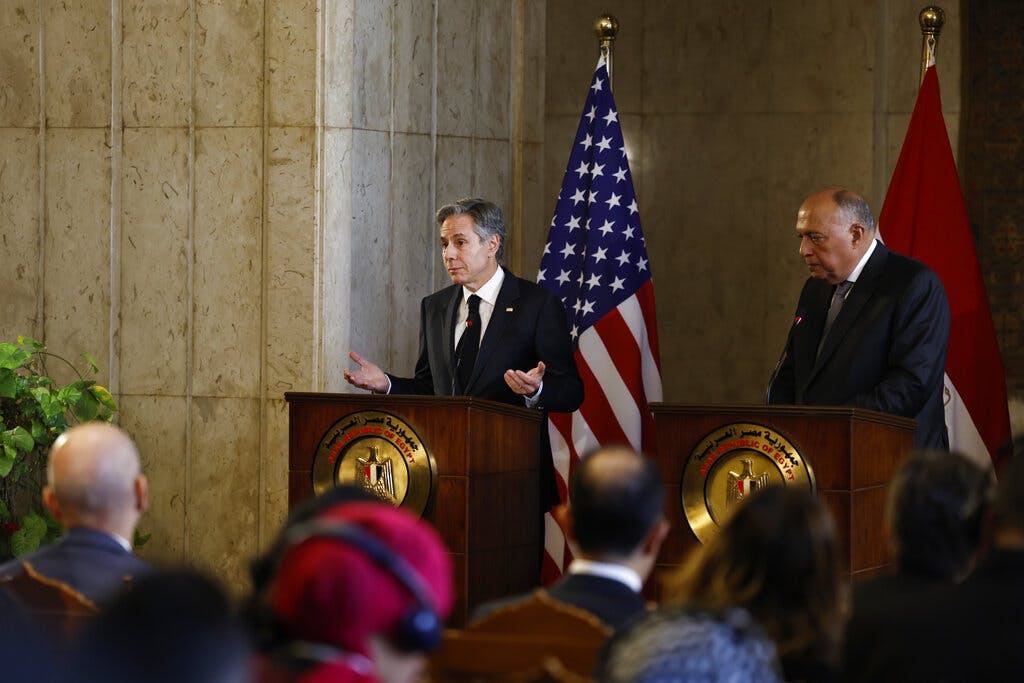Time for the West To Choose: Iran or Ukraine
By continuing to pursue a revival of the Iran nuclear deal, the Islamic Republic would soon be free to ship missiles to Russia for use against Ukraine. Yet the door is open at the UN to reimpose harsh sanctions on Iran for its violations of the deal.

With a diplomatic window at the United Nations closing slowly, America and its European allies face a choice: Pursue their doomed attempt at appeasing Iran or live up to their oft-expressed “full support” of Ukraine’s defense against Russian aggression.
It might seem a simple decision, but America and the Europeans are clinging to the idea that Iran’s nuclear program can be contained by diplomatic means. Advocacy groups backed by philanthropists George Soros and Charles Koch are even reportedly lobbying President Biden to revive the doomed 2015 Joint Comprehensive Plan of Action.
The Islamic Republic’s violations of the nuclear deal aside, the JCPOA’s expiration dates are approaching, one of which would allow Iran to export ballistic missiles with impunity starting later this year, likely meaning more help for Russia in its unprovoked war against Ukraine. To head off this eventuality, the UN Security Council resolution that backed the JCPOA would need to be challenged by one of the deal’s signatories.
That resolution, UNSC 2231, contains several “sunset” clauses. As long as Iran fully complies with the resolution, it says, sanctions will gradually be eased. One such clause removed in 2020 an arms embargo that barred the Islamic Republic from selling or buying any sort of weapon. By January 2031 all sanctions would end, allowing Iran to freely pursue nuclear weapons.
The next sunset clause is directly related to the war raging at the heart of Europe: By October, a ban would be lifted on Iranian research, development, and production of ballistic missiles. The regime would then be free to import and export missile-related technology.
Yet the 2015 resolution contains a “snapback”mechanism that allows any of the original JCPOA parties to undo it. If the mechanism is activated, all international sanctions that had been imposed on Iran prior to the 2015 deal will be revived.
Each of the six JCPOA parties could unilaterally cite an Iranian “material breach” of the resolution as a reason to snap it back, and no council member would be able to veto the move. Despite numerous Iranian violations, however, Britain, France, Germany, and America have declined to trigger that resolution’s self-destruct mechanism.
In 2020, President Trump did urge a snapback, but as he had withdrawn America’s support of the JCPOA two years earlier, the rest of the council’s members argued that he had no authority to do so. Then, much to the relief of Britain, France, and Germany, Mr. Biden canceled America’s call for a snapback.
In 2021, though, the West was not yet dealing with the Russian war, and the only countries that were seriously threatened by Iranian missiles and drones were in the Mideast, like Israel. Things are different now.
“Iran is a threat not only to Israel and the region, but increasingly to the world, as we’ve seen recently in its provision of drones to Russia to prosecute its war of aggression in Ukraine,” Secretary Blinken said during this week’s visit to Israel. “Not only is Iran providing sophisticated military equipment to Russia, but Russia in turn is doing the same with Iran.”
Mr. Biden, then, has an incentive to activate the resolution’s snapback mechanism, or to lean on one of the European allies to do so soon: It could help the West’s effort to defeat Russia in Ukraine, even at the cost of ending an ever-elusive revival of a 2015 deal with Iran.
“This is a moment of showdown, a moment of choosing: Are the Americans and the Eureopans on the Iranian side, or on Ukraine’s side?” a Trump-era White House aide who worked on countering Iran’s weapons of mass destruction, Richard Goldberg, told the Sun.
As Iran is enriching uranium to more than 60 percent, Mr. Goldberg, who is now at the Foundation for Defense of Democracies, says, and as it blocks international nuclear monitors and otherwise violates the JCPOA, there are ample reasons to trigger the snapback mechanism.
Mr. Biden prizes multilateralism, Mr. Goldberg added. Triggering “snapback” at the Security Council should therefore be more attractive for Washington and the Europeans than other options, such as enforcing unilateral missile-related sanctions on Iran.
Western diplomats at the UN, who spoke on condition that they would not be quoted by name, confirmed that Iran’s violations are a cause for concern. As yet, however, neither America, nor any of its three European allies have begun discussing the snapback process, which would preserve the embargo on Iranian missiles for the foreseeable future.
Mr. Blinken noted that last year Iran “rejected” an attempt to revive the JCPOA. Yet, he insisted that diplomacy “is never off the table.” When the state department’s Iran point man, Robert Malley, was asked by the BBC if the deal was dead, he said, “I wasn’t hired to write obituaries.”
By going to the UN now, America and its allies can indeed write the JCPOA’s obituary but they must act fast: One of the council resolution’s sunset clauses ends the snapback option as early as 2025.

